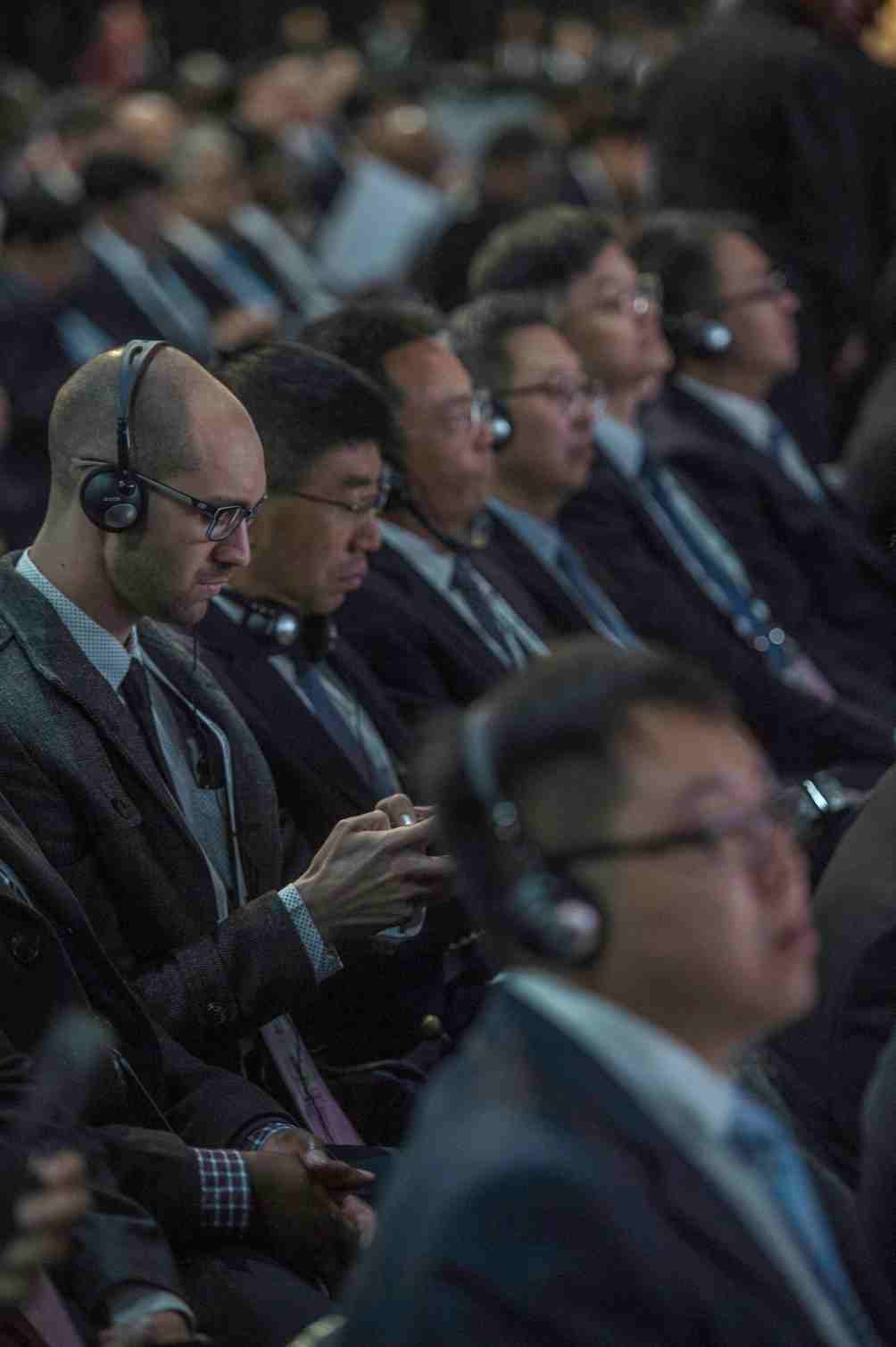


BRICS delegates listen to South African Trade and Industry Minister on the first day of the 10th BRICS summit at Sandton Convention Center, in Sandton district of Johannesburg on July 25, 2018. (Photo: VCG)
BRICS not about ‘forming a clique’ against US trade policy
The 10th BRICS Summit, which opened on Wednesday, is expected to inject new momentum for African countries in their move toward a development path that is more diverse and independent, said Chinese analysts on Wednesday.
The summit was scheduled to run from Wednesday to Friday at the Sandton Convention Center in Johannesburg, South Africa.
Globalization, inclusive development and shared prosperity will top the summit's agenda amid escalating trade tensions, protectionism and unilateralism, He Wenping, a research fellow at the Institute of West Asian and African Studies of the Chinese Academy of Social Sciences in Beijing, told the Global Times on Wednesday.
BRICS' five member states - Brazil, Russia, India, China and South Africa - share a firm determination to promote multilateralism, and the bloc's cooperation with the African countries is a strong counter to the trend toward unilateralism, she noted.
South African government officials on Tuesday reiterated their opposition to isolationist policies and anti-globalization, saying they harm global trade, the Xinhua News Agency reported.
During a high-level panel discussion prior to the BRICS Summit, South African Minister of Finance Nhlanhla Nene said there is a consensus among many countries that the correct path to development is the rules-based open market system.
However, the summit is not about "forming a clique" against the US, as all five members have been adversely impacted by trade protectionism and need open and free trade, Wang Youming, director of the Institute of Developing Countries under the China Institute of International Studies, told the Global Times on Wednesday.
Shared development
Leaders of nine African countries have also been invited to attend a dialogue under the BRICS framework on external cooperation.
"BRICS Plus" will see leaders from Rwanda, Uganda, Togo, Zambia, Namibia, Senegal, Gabon, Ethiopia and Angola take part in the dialogue.
Enhanced cooperation among BRICS nations and African countries could help the latter create a more diverse and independent approach to development, Liu Haifang, executive director of the Center for African Studies at Peking University, told the Global Times on Wednesday.
"In order to maintain sustainable development and minimize the risks inherent in the policy uncertainties of traditional powers, African countries must abandon the twisted development mode of colonial times," said Liu, adding that the BRICS summit serves as a practical step in reaching that goal.
China and Brazil could offer expertise in modern agriculture suitable to the needs of African countries, while India has sufficient experience in human resources, medicine, health, and the software industry, said Liu.
BRICS gathers the world's five major emerging economies which represent about 40 percent of the global population and one-quarter of the world economy.
Multilateral mechanisms that enable emerging markets to better cope with risks are likely on the summit agenda, said experts. These might include China's yuan payments and rating systems, they said.
Another example of shared development is the New Development Bank, BRICS' financial arm headquartered in Shanghai. It has approved 21 projects worth $5.1 billion since its launch in July 2015.
Over the years, BRICS has also focused on increasing people-to-people ties, through museum exhibitions, film festivals and educational programs. These events are designed to boost understanding and trust between the peoples of member states and consolidate a foundation for closer partnerships.
BRICS Plus
The BRICS Plus model, which highlights inclusive development that benefits all parties involved, is a significant effort to better engage developing countries in global governance, which remains dominated by traditional powers, said Liu.
Assistance and investment from Western countries is often tied to their standard of political and human rights, which are not always suitable or may be even wrong, considering the cultural differences among African nations, said Liu.
"The G20, the Shanghai Cooperation Organization and BRICS are moving global governance toward a fairer, more reasonable and inclusive path," said Wang.
 Fire brigade in Shanghai holds group wedding
Fire brigade in Shanghai holds group wedding Tourists enjoy ice sculptures in Datan Town, north China
Tourists enjoy ice sculptures in Datan Town, north China Sunset scenery of Dayan Pagoda in Xi'an
Sunset scenery of Dayan Pagoda in Xi'an Tourists have fun at scenic spot in Nanlong Town, NW China
Tourists have fun at scenic spot in Nanlong Town, NW China Harbin attracts tourists by making best use of ice in winter
Harbin attracts tourists by making best use of ice in winter In pics: FIS Alpine Ski Women's World Cup Slalom
In pics: FIS Alpine Ski Women's World Cup Slalom Black-necked cranes rest at reservoir in Lhunzhub County, Lhasa
Black-necked cranes rest at reservoir in Lhunzhub County, Lhasa China's FAST telescope will be available to foreign scientists in April
China's FAST telescope will be available to foreign scientists in April "She power" plays indispensable role in poverty alleviation
"She power" plays indispensable role in poverty alleviation Top 10 world news events of People's Daily in 2020
Top 10 world news events of People's Daily in 2020 Top 10 China news events of People's Daily in 2020
Top 10 China news events of People's Daily in 2020 Top 10 media buzzwords of 2020
Top 10 media buzzwords of 2020 Year-ender:10 major tourism stories of 2020
Year-ender:10 major tourism stories of 2020 No interference in Venezuelan issues
No interference in Venezuelan issues
 Biz prepares for trade spat
Biz prepares for trade spat
 Broadcasting Continent
Broadcasting Continent Australia wins Chinese CEOs as US loses
Australia wins Chinese CEOs as US loses